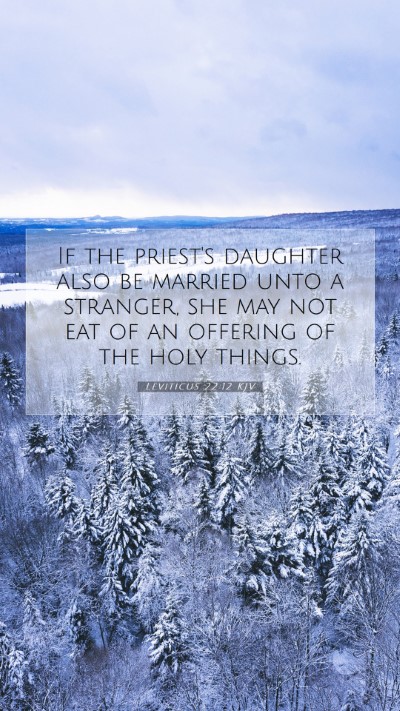Understanding Leviticus 22:12
Leviticus 22:12 states: "If the priest's daughter is married to a stranger, she may not eat of the holy offerings." This verse provides significant insights regarding the laws and obligations pertaining to the priestly family within the context of ancient Israelite worship.
Bible Verse Meanings
This verse delineates the specific responsibilities and privileges related to those in the Levitical priesthood. According to Matthew Henry, this directive illustrates the separation between the sacred duties of the priestly offices and those outside the covenant community.
Albert Barnes expounds on this by emphasizing that being married to a 'stranger' (a non-Israelite) excludes the priest's daughter from partaking in the holy offerings, thereby signifying the importance of maintaining holiness and purity in worship practices.
Adam Clarke further expands to discuss that this restriction was heavily tied to the integrity of the priesthood and their offerings. It reflects the notion that within God's system of worship, not all members of society are allowed the same privileges, particularly concerning sacred elements reserved for those who fulfill divine roles.
Historical Context
The context of this verse must be understood within the broader narrative of Leviticus, which lays out various laws intended to maintain holiness among the people of Israel. Matthew Henry notes that such laws were set to ensure that the priesthood remained distinct and that their children, too, embodied these values.
During the time of the Levitical priests, marriage relationships had implications on one's social and spiritual status. Albert Barnes points out that this reflects the overarching principle of Israel's separation from surrounding nations, adhering to God's standards and commands.
Meaning of Bible Verses
- Separation of Sacred and Secular: The priest's daughter married to a stranger underscores the concept of holiness that was crucial among the Israelite community.
- Holiness in Worship: The divine directives in Leviticus expertly highlight the serious nature of worship and how proximity to God’s sacred acts rendered certain behaviors unacceptable.
- Implications for Family: This verse signifies that not only the priests but also their immediate family were tasked with upholding the values vital to their covenant with God.
Scripture Analysis
In-depth Bible verse analysis reveals that Leviticus 22:12 serves as an important reminder of God's demand for holiness. Adam Clarke notes that the rejection of a priest's daughter's role in the holy offerings if married to a non-Israelite signifies the broader theme of maintaining spiritual integrity.
The priestly family's function was not just a role but a commitment to live according to God’s covenant. This speaks to those engaged in Bible study insights who seek to apply biblical principles in their daily lives.
Application of the Verse
Understanding Leviticus 22:12 offers practical lessons for modern lives. It calls believers in their various roles to recognize the importance of their social choices and how these impact their spiritual commitments. As contemporary followers of God, being 'set apart' in conduct and choices is fundamental.
Related Bible Verses
- Exodus 28:1: Discusses the role of Aaron and his sons as priests.
- Leviticus 21:9: Explains the consequences of a priest's daughter becoming a harlot.
- Deuteronomy 7:3-4: Advises against marrying outside the Israelite community to avoid spiritual straying.
Conclusion
Leviticus 22:12 serves not only as a historical directive but also as a timeless principle reminding believers of their identity and responsibilities within both sacred and secular realms. By applying the understanding and interpretations of such verses, one can engage deeply with Scripture and enhance their Bible study experience through careful examination and reflection.


